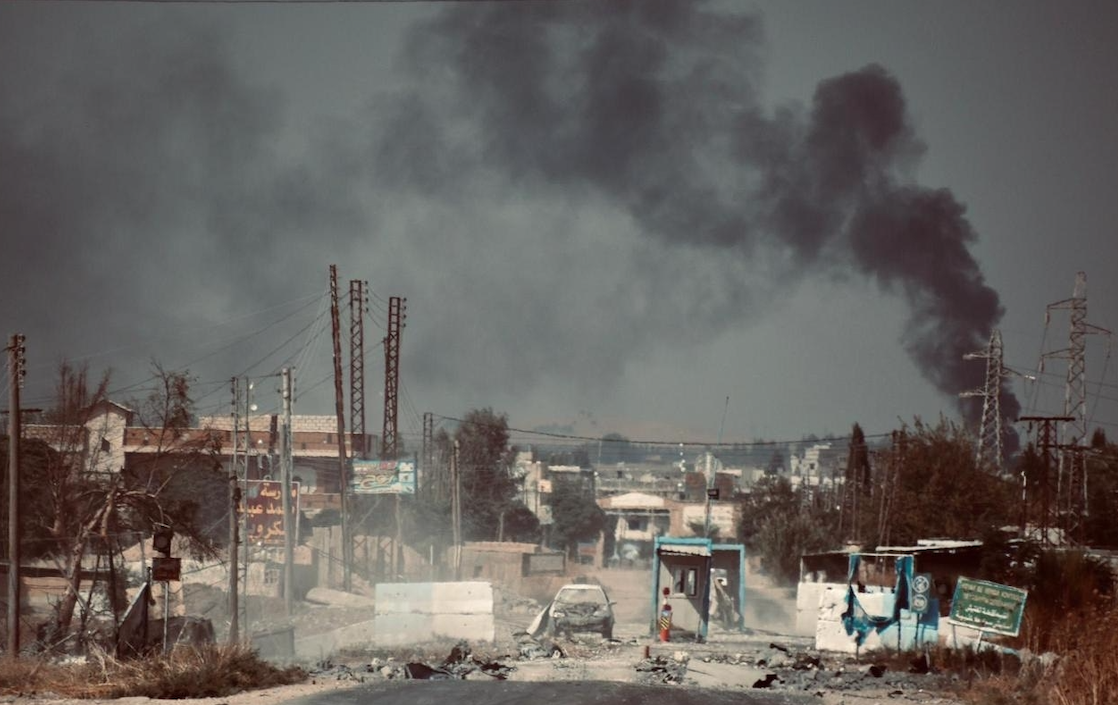Short of military intervention, the EU has ways to help stabilize the region, writes Attilio Moro.
 By Attilio Moro
By Attilio Moro
in Brussels
Special to Consortium News
 During the recent crisis in Kurdistan, the European Union has been conspicuously absent — although it could play an important role in stabilizing the region and ending the violence.
During the recent crisis in Kurdistan, the European Union has been conspicuously absent — although it could play an important role in stabilizing the region and ending the violence.
Turkey and Syria are neighbors to various EU countries, which means every regional conflict triggers a new wave of refugees and adds to the chronic instability along the Mediterranean rim (such as in Lebanon, Egypt, Tunisia and Libya)which affects countries throughout Europe.
Unfortunately, as often happens, Europe is simply watching. This was true in the Balkans 20 years ago when, in the end, the EU had to ask the U.S. to overthrow the Slobodan Milosevic. At present, it appears it is up to Russia — which is under EU and U.S. sanctions — to try to restore stability.
Why? First, the EU doesn’t have an army to enforce its decisions, in the unlikely case it makes any. Second, the only country with an army capable of intervening is France. But in general, national armies only respond to national interests. Thus, until now, attempts to build a European army have failed.
>>Please Donate to Consortium News’ Fall Fund Drive<<
In recent months, Germany’s Chancellor Angela Merkel understood that the EU can no longer rely on the U.S. or NATO for defense — since President Donald Trump considers the latter expensive and irrelevant. Also, the EU needs an autonomous voice in world affairs. Thus, she launched the European Intervention Initiative (IEI), a project among 13 European nations whose commanders meet twice a year in Paris to create a troop contingent for rapid intervention, if it should be needed. However, according to experts, it will take 10 years to build one that could intervene in a month or more from the time a decision is taken.

Syrian town of Ras al-Ayn on Oct. 11, 2019 after Turkish airstrikes. (A. Lourie, Wikimedia Commons)
The EU Has Soft Powers
But military intervention is not the best course for an EU foreign policy. The EU has other means, including so-called soft powers — which include diplomacy and economic aid. As for the first, much authority has been lost since Merkel, supported by European leaders, cut a deal with Turkey — giving President Recep Erdogan 6 billion euros a year to keep Syrian refugees away from EU borders, regardless of the conditions of their detention. This deal has put the EU at Erdogan’s mercy: whenever he wants, he can open the doors and flood Europe with 3 million refugees.
Then there’s the cynical competition in Libya between Italy’s oil company, Eni, and France’s Total, which impedes united actions and makes any peace in the country impossible. The first supports Fayez al-Sarraj, Libya’s prime minister who represents the Government of National Accord that was installed in 2015, as part of a UN-led political agreement. The second backs his enemy, Khalifa Haftar, a Libyan general who supports militias that profit from smuggling humans to European coasts.
Thus, the only power left is money. The EU has always used it to meet its foreign policy goals — from migration to stabilization in the Balkans or in the Mediterranean. But it often spends the funds in a bureaucratic and ineffective way. For example, the EU still gives Turkey more than 2 billion eurosa year to help Ankara make the reforms needed to join the EU. This process started 20 years ago when Turkey formally asked to join the EU and Brussels acknowledged the request, granting funds and creating a joint team to work on it. After Erdogan came to power, it was increasingly clear that for the next two or three decades, Turkey would not be able to join the EU. However, the billions still flow. Given such sums, Europeans could at least suspend them and pressure Erdogan to halt the process.
Another course could be to slap duties on some Turkish exports to the EU, limiting the special treatment it has enjoyed so far. But no one dares make such a proposal becauseGermany hosts millions of Turkish migrants who would be decidedly dissatisfied: in the recent past, Turkish immigrants have held huge street demonstrations in Germany supporting Erdogan. Some protesters were German citizens.
Also, EU nations’ attitudes towards Turkey depend on the size of their exports (to Turkey), another reason why unified policies are tough to achieve.
In the long term, if the EU wants to survive as a political entity — and not just as a common market — it must speak with a single voice, even if this requires some sacrifices. These could include reducing national exports or curtailing national corporate interests that influence the EU country’s foreign policy — regardless of the effect these policies may have on more general European interests. If the EU learns to use its powers effectively, it could help stabilize the unruly but important south Mediterranean basin and Middle East, and be a positive force, globally.
Attilio Moro is a veteran Italian journalist who was a correspondent for the daily Il Giorno from New York and worked earlier in both radio (Italia Radio) and TV. He has travelled extensively, covering the first Iraq war, the first elections in Cambodia and South Africa, and has reported from Pakistan, Lebanon, Jordan and several Latin American countries, including Cuba, Ecuador and Argentina. Presently, he is a correspondent on European affairs based in Brussels.
If you value this original article, please consider making a donation to Consortium News so we can bring you more stories like this one.
Before commenting please read Robert Parry’s Comment Policy. Allegations unsupported by facts, gross or misleading factual errors and ad hominem attacks, and abusive or rude language toward other commenters or our writers will be removed. If your comment does not immediately appear, please be patient as it is manually reviewed. For security reasons, please refrain from inserting links in your comments.
>>Please Donate to Consortium News’ Fall Fund Drive<<

Attilio,’un c’hai capito na’ sega. L’europa come entità unica esiste solo per le banche che si sono tragugiate le ricchezze dei popoli europei, specialmente italiano, spagnolo, greco e portoghese… in cambio di cosa? diccelo!
Dopodichè tornare alla Lira sarebbe un’iniezione di salute per l’economia che è talmente enorme che nessuno ne vuole parlare, si scoprirebbero ancora più verità che vogliono essere tenute celate.
Inoltre per un paese come il nostro che si è trovato servo di altri ha bisogno di riprendersi una po’ di autonomia e indipendenza, ne va della nostra ricchezza (futura), quella che avevamo non c’è più i tuoi padroni ce l’hanno tolta
There is another option.
Enact an arms embargo to the entire region.
Insist US forces vacate the region. Syria, Turkey, Iraq, all of it.
“in the Balkans 20 years ago when, in the end, the EU had to ask the U.S. to overthrow the Slobodan Milosevic. ”
That turned out so well, did it not, and only years later was Milosovic quietly and posthumously exonerated. Serbia has not fared so well.
When exactly have sanctions ever worked?
“We have heard that half a million children have died. I mean, that’s more children than died in Hiroshima. And, you know, is the price worth it?” Madeleine Albright: “I think this is a very hard choice, but the price—we think the price is worth it.”
Do you similarly believe the EU should slap sanctions on Italy to motivate the citizens to clean up the Cosa Nostra?
The Syrian operation was sponsored through the US, UK, France, the US, the Saudis, Israel, and yes, and Turkey. So, should the rest of the world start sanctioning the key players.
I have a much better idea, why doesnt the US stop supporting Kurdistan and force them to reconcile with Assad, so we dont have another genocidal ethnostate doing the US and Israel’s dirty work in the Middle East.
Are you serious?
So, the author thinks that more outside meddling is the best way forward for Syria and the Kurds, is that it?
How many foreign nations are already involved: The US, Turkey, Russia, Iran, Qatar, Saudi Arabia, Germany, France as well as sunni militants that have arrived from locations around the world. And now you think Syria needs more foreign influence to end the war?
This is interventionist lunacy! A half a million people have already died and 7 million more have been displaced. Can’t we just leave these poor people alone? Can’t we see tht they were better off under Assad? Weren’t the Syrians and Kurds better off before their entire country was reduced to rubble and the bulk of their population was spread to the four winds?
What sort of cynic would possibly recommend more meddling when the country’s infrastructure is already in ruins and the dead have not even been buried?
No, Syria does NOT need the EU sticking its big nose its business. Just tend to your own garden and stay the hell out!
Absolutely right!
The main problem for Europe is the wave of refugees coming from Africa and Middle East. Trying to stabilize the region with the available soft powers is not meddling but a necessary step to prevent implosion
Just this week we learned that a single Dutch bombing in 2015 in Iraq killed 70 civilians. Not the best way to solve the refugee question.
Just yesterday Macron announced immigration quotas for France… it is so obvious that there is no working EU policy in this matter.
The problem is the EU is already meddling massively in Syria by its embargo, cutting off Syria’s oil imports even as it supports US theft of Syria’s own oil. The EU needs to “stick its nose in” by restoring normal trade with Syria and contributing to the rebuilding of the country it destroyed by supporting the CIA’s jihadi proxy war against it.
The title and the article are a mismatch. Most of the article deals with Turkey, Erdogan and the EU’s relationship to both. Just where is Kurdistan? The author seems to know but the countries in the region see the Kurds as living in their respective countries and the mention of Kurdistan is a red flag. The Kurdish question is an issue for these countries and hopefully they will talk to each other about how best to deal with the issue. If the EU wants to use its influence, it should be to that end. Ditto the United States.
In the long term if the EU wants to survive it should not focus on foreign policy but on the lack of transparancy and democracy within its own institutions .
Why write about the EU needing to stabilise ‘Kurdistan’ when thousands protest in the streets of Barcelona, can’t find candidates for its own commission and can’t get Brexit done ? Foreign policy as a cover up for EU own inabilities….
Europe created the problem a century ago by splitting up tje Ottoman Empire.